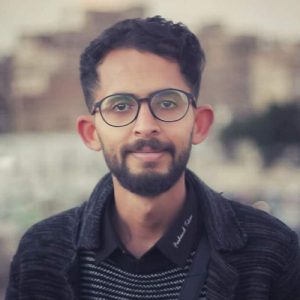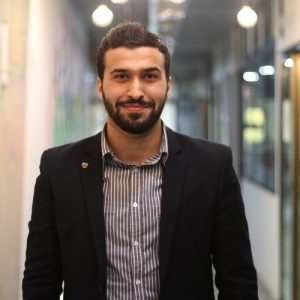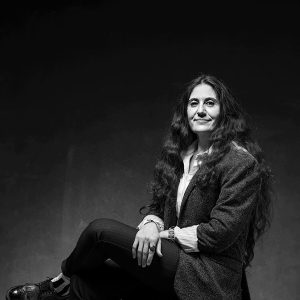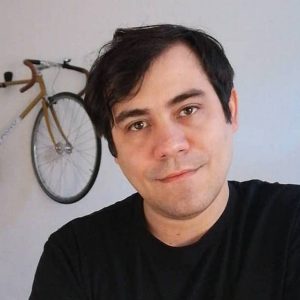5 Oct 2022 | Afghanistan, Africa, Americas, Asia and Pacific, Brazil, Bulgaria, China, Europe and Central Asia, India, Israel, Kenya, Magazine, Magazine Contents, Middle East and North Africa, North Korea, Palestine, Poland, Qatar, Romania, Saudi Arabia, United States, Volume 51.03 Autumn 2022, Volume 51.03 Autumn 2022 Extras
The autumn issue of Index takes as its central theme the FIFA World Cup that will take place in Qatar in November and December 2022.
A country where human rights are constantly under threat, Qatar is under the spotlight and many are calling for a boycott of the tournament.
Index spoke to journalists, human rights activists and philosophers for the latest issue to understand their view on the tangled relationship between football and human rights. Is football really the beautiful game?
Upfront
The Qatar conundrum, by Jemimah Steinfeld: The World Cup is throwing up questions.
The Index, by Mark Frary: The latest in the world of freedom of expression, with internet shutdowns and Salman Rushdie’s attack in the spotlight. Plus George M Johnson on being banned.
Features
An unholy war on speech, by Sarah Myers: A woman sits on death row in Pakistan. Her crime? Saying she was a prophet.
Perfecting the art of oppression, by Martha Otwinowski: Poland’s art scene is the latest victim of nasty politics.
Poland’s redemption songs, by Martin Bright: In anti-apartheid solidarity, reggae rode with revolution in Europe.
Fighting back against vendetta politics, by Hanan Zaffar and Hamaad Habibullah: In India, tackling fake news can land you in a cell.
The mafia state that is putty in Putin’s hands, by Mark Seacombe: The truth behind the spread of pro-Russian propaganda in Bulgaria.
Bodies of evidence, by Sarah Sands: A new frontier of journalism with echoes of a crime scene investigator.
Chasing after rights, by Ben Rogers: The activist on being followed by Chinese police.
The double closet, by Flo Marks: Exploring the rampant biphobia that pushes many to silence their sexuality.
Is there a (real) doctor in the house? By John Lloyd: One journalist uncovers the secret of Romania’s doctored doctorates.
The mice hear the words of the night, by Jihyun Park: A schooling in free expression, where the classroom is North Korea.
The most dangerous man in Guantanamo, by Katie Dancey-Downs: After years in Guantanamo, a journalist dedicates himself to protecting others.
America’s coolest members club, by Olivia Sklenka: Meet the people fighting against the surge in book bans.
Special report: The beautiful game?
Victim of its own success? By Simon Barnes: Blame the populists, not the game.
Stadiums built on suffering, by Abdullah Al-Maliki: Underneath the suds of Qatar’s sportswashing, fear and terror remain.
Football’s leaving home, by Katie Dancey-Downs: Khalida Popal put women on the pitch in Afghanistan, before leading their evacuation.
Exposing Saudi’s nasty tactics, by Adam Crafton: A sports journalist is forced into defence after tackling Saudi Arabia’s homophobia.
It’s foul play in Kashmir, by Bilal Ahmad Pandow: Protest and politically motivated matches are entwined in Kashmir’s football history.
How ‘industrial football’ was used to silence protests, by Kaya Genç: Political football: how to bend it like Erdoğan.
Xi’s real China dream, by Jonathan Sullivan: While freedoms are squeezed, China’s leader has a World Cup-sized dream.
Tackling Israel’s thorny politics, by Daniella Peled: Can Palestinians de-facto national team carve out a space for free expression?
The stench of white elephants, by Jamil Chade: Brazil’s World Cup swung open Pandora’s Box.
The real game is politics, by Issa Sikiti da Silva: Is politics welcome on the pitch in Kenya?
Comment
Refereeing rights, by Julian Baggini: Why we shouldn’t expect footballers to hand out human rights red cards.
The other half, by Permi Jhooti: The real-life inspiration behind Bend it like Beckham holds up a mirror to her experience.
We don’t like it – no one cares, by Mark Glanville: English football has moved away from listening to its fans argues this Millwall supporter.
Much ado about critics, by Lyn Gardner: A theatre objects to an offensive Legally Blonde review.
On reputation laundering, by Ruth Smeeth: Beware those who want to control their own narrative.
Culture
The soul of Sudan, by Stella Gaitano and Katie Dancey-Downs: What does it mean for deep-running connections when you’re forced to leave? Censored writer Stella Gaitano introduces a new translation of her work.
Moving the goalposts, by Kaya Genç and Guilherme Osinski: Football and politics are a match made in Turkey. Kaya Genç fictionalises an unforgettable game.
Away from the satanic, by Malise Ruthven: A leading expert on Salman Rushdie writes about an emerging liberalism in Islamic discourse.
16 Sep 2022 | Belarus, Brazil, China, Iran, North Korea, Opinion, Russia, Ruth's blog, Saudi Arabia, Sri Lanka, Turkey, United Kingdom
The United Kingdom is in a period of national mourning, marking the passing of our head of state, Her Majesty Queen Elizabeth II. Global media has been transfixed, reporting on the minutiae of every aspect of the ascension of the new monarch and the commemoration of our former head of state. While the pageantry has been consuming, the constitutional process addictive (yes I am an addict) and the public grief tangible – the traditions and formalities have also highlighted challenges in British and global society – especially with regards to freedom of expression.
We have witnessed people being arrested for protesting against the monarchy. While the protests could be considered distasteful – I certainly think they are – that doesn’t mean that they are illegal and that the police should move against them. Public protest is a legitimate campaigning tool and is protected in British law. As ever, no one has the right not to be offended. And protest is, by its very nature, disruptive, challenging and typically at odds with the status quo. It is therefore all the more important that the right to peacefully protest is protected.
While I was appalled to see the arrests, I have been heartened in recent days at the almost universal condemnation of the actions of the police and the statements of support for freedom of expression and protest in the UK, from across the political system.
What this chapter has confirmed is that democracies, great and small, need to be constantly vigilant against threats to our core human rights which can so easily be undermined. This week our right to freedom of expression and the right to protest was threatened and the immediate response was a universal defence. Something we should cherish and celebrate because it won’t be long before we need to utilise our collective rights to free speech – again.
Which brings me onto the need to protest and what that can look like, even on the bleakest of days. On Monday, the largest state funeral of my lifetime is being held in London. Over 2,000 dignitaries are expected to attend the funeral of Her Majesty, Queen Elizabeth II, in Westminster Abbey. The heads of state of Russia, Belarus, Afghanistan, Syria, Venezuela and Myanmar were not invited given current diplomatic “tensions”. While I completely welcome their exclusion from the global club of acceptability, it does highlight who was deemed acceptable to invite.
Representatives from China, Brazil, Saudi Arabia, Turkey, Iran, North Korea and Sri Lanka will all be in attendance, all of whom have shown a complete disregard for some of the core human rights that so many of us hold dear. Can you imagine the conversation between Bolsonaro and Erdogan? Or the ambassador to Iran and the vice president of China?
While I truly believe that no one should picket a funeral – the very idea is abhorrent to me – that doesn’t mean that there are no other ways of protesting against the actions of repressive regimes and their leadership, who will be in the UK in the coming days. In fact the British Parliament has shown us the way – by banning representatives of the Chinese Communist Party from attending the lying in state of Her Majesty – as a protest at the sanctions currently imposed on British parliamentarians for their exposure of the acts of genocide happening against the Uyghur population in Xinjiang province. This was absolutely the right thing to do and I applaud the Speaker of the House of Commons, Rt Hon Lindsay Hoyle MP, for taking such a stance.
Effective protest needs to be imaginative, relevant and take people with you – highlighting the core values that we share and why others are a threat to them. It can be private or public. It can tell a story or mark a moment. But ultimately successful protests can lead to real change. Even if it takes decades. Which is why we will defend, cherish and promote the right to protest and the right to freedom of expression in every corner of the planet, as a real vehicle for delivering progressive change.
7 Jul 2022 | News, Turkey, Turkey
In the name of counter-terrorism, police raided the houses of journalists in Diyarbakır, in the Kurdish region of Turkey, on 8 June. They took into custody 19 journalists, two media employees and one citizen, who had given an interview to a journalist. Two criminal investigations were announced to target “the Press Structure of the Kurdish Workers Party (PKK) and Kurdistan Communities Union (KCK)”.
Journalists who work in eastern Turkey face tremendous pressures as they are almost always the ones who expose rights violations by the state in a conflict between Turkish authorities and Kurdish groups, which has been going on since the early 1980s. The PKK has called for more rights for Kurdish people, and the armed conflict has cost over 40,000 lives. Turkey considers the PKK a terrorist organisation, as do the EU and US.
In addition to the journalists’ houses, police raided the offices of three production companies and the women’s news agency Jin News in an unlawful manner. The search conducted at the Jin News agency was carried out without any representative of the agency being notified or present. The police are yet to provide a record of what has been confiscated.
After being extended twice, the custody period eventually amounted to eight days. In her indictment-like extension petitions, the prosecutor directly accused the journalists without presenting any evidence. Furthermore, she justified the extensions by saying the confiscated material needed extensive examination. According to the lawyers, however, this long custody period served the manufacturing of new evidence.
The interrogation of the journalists began on 15 June at around 9am. The prosecutor questioned the journalists about their professional activities. She asked why they worked at their respective media outlets, why they produced particular programmes or news articles, and why they used specific expressions.
While neither the lawyers nor the journalists were granted access to the investigation file – which violated their right to defence – investigation details were leaked to media organisations close to the government. According to these news reports, journalists are accused of “operating as the PKK and KCK Press Structure.”
After an interrogation lasting nearly 20 hours, the prosecutor referred 18 journalists, two media employees and one citizen to the Diyarbakır 1st Criminal Judgeship of Peace and requested their arrest on suspicion of “membership of a terrorist organisation”. Within 15 minutes, the judge ruled to arrest 16 of the journalists. In the decisions, the judge did not refer to any concrete evidence other than the testimonies of defectors from the PKK who claimed that the journalists produced content for Sterk TV, Medya Haber TV, Jin TV and Rohani TV – all of which are considered as PKK outlets by Turkish authorities. The judge released four journalists, one media employee and the sole citizen from custody, along with judicial control measures.
This is not an isolated incident. A recent example is when five journalists reported on two villagers who were tortured and thrown out of a helicopter by security forces in Van, also in eastern Turkey. Four of them were held in pre-trial detention for six months until the first hearing. Accompanied with discrediting campaigns on social and mainstream media, these journalists were tried under terrorism charges and were eventually acquitted. Acquitted or not, this recent operation is the largest of its kind targeting the Kurdish press in recent years. It is reminiscent of the infamous “KCK Press Trials”, in which 46 journalists and media employees have been standing trial for the past 10 years.
This latest operation targeting Kurdish journalists signals that the government is once again flexing its muscles to silence journalists in the region ahead of the upcoming elections next year.
The 16 arrested journalists:
Lezgin Akdeniz: Camera operator, TV show producer
Safiye Alagaş: Jin News Director
Serdar Altan: Freelance journalist, Dicle Fırat Journalists’ Association (DFG) Co-chair
Zeynel Abidin Bulut: Xwebûn editor, DFG executive
Ömer Çelik: TV show host, former Mesopotamia News Agency editor
Suat Doğuhan: Camera operator, Pel Production owner
Mehmet Ali Ertaş: Xwebûn Editor-in-chief
Ramazan Geciken: Pel Production camera operator
Mazlum Doğan Güler: Piya Production camera operator
İbrahim Koyuncu: Camera operator, video editor
Abdurrahman Öncü: Pel Production camera operator
Aziz Oruç: Mesopotamia News Agency editor
Mehmet Şahin: Xwebûn columnist, teacher
Neşe Toprak: Pel Production TV show producer
Elif Üngür: Piya Production TV show host
Remziye Temel: Piya Production accountant
For more details on the arrests, visit MLSA.
16 May 2022 | Awards, Cuba, Fellowship, Fellowship 2022, Palestine, Turkey, Yemen
 Yemeni artist Thiyazen Al-Alawi uses his craft to shed light on the destructive situation in Yemen through street art campaigns. He hopes to inform the public of what the war has done to his homeland.
Yemeni artist Thiyazen Al-Alawi uses his craft to shed light on the destructive situation in Yemen through street art campaigns. He hopes to inform the public of what the war has done to his homeland.
First inspired by the Arab Spring in 2011 as a teenager, Thiyazen turned to art as a form of self expression, launching his first street art campaign in 2012 as the war began. As conflict invaded every aspect of Yemeni life, he decided “every artwork is proof of their existence and continuity in life…something that gives people hope.” Thiyazen’s work aims to reflect the ugliest and truest forms of war, and its effect on real people.
Thiyazen’s latest project is a collaboration with British artist Luc Waring titled “Letters from Yemen”, a series of drawings and letters from conversations between the two about art, peace, war, and the horrors Thiyazen has witnessed himself. Inspired by a saying Thiyazen heard in his youth, the walls must do the talking when the newspapers are silent; the compiled writings and portraits raise awareness about the war in Yemen with a sensitivity and humanity only an artist and their medium can produce, eventually gaining traction and attention by the public. Due to the ongoing occupation by the Houthi militia, Thiyazen is risking his own safety as he continues to produce art.
Thiyazen continues his work on long-term projects with the Swiss Arts Council to spread awareness about the conditions in Yemen. He also contributes to the “Yemen Peace Forum” with the Sana’a Center for Strategic Studies, writing articles and studies like “Art and Youth in Yemen” in the Journal of Transitional Justice of the University of Oxford. “I feel that I must tell the truth no matter what,” Thiyazen explains,” I could sacrifice my life for the truth. And nothing will stop me.”
 Moe Moussa is a journalist, podcaster, poet, and the founder of the Gaza Poet Society. He uses various forums and mediums to amplify the voices of Palestinians.
Moe Moussa is a journalist, podcaster, poet, and the founder of the Gaza Poet Society. He uses various forums and mediums to amplify the voices of Palestinians.
Moe began his career as a translator for international journalists in 2014. He was soon inspired to speak about the situation from his own perspective. Studying English literature in college and growing up around poetry, it was only fitting that Moe decided to use his art to bring the individual lives of people in Gaza to the international audience.
Delving into Palestinian poetry led Moe to connect online with poets all over the world. He was interested in using his skills as a poet and a journalist to share the stories of individual lives with a global audience. After realising the lack of opportunities for poets to share their work in Arabic and English, he created a space to offer an opportunity for young people to speak and find their own voice in 2018 – the Gaza Poet Society. The organisation is supported solely by donations from international poets who believe in Moe’s cause. He is at constant risk of Hamas censorship and at the will of the Gazan government to approve of civilian movement out of the country.
Watching his family go days without water, power, and freedom of movement, Moe temporarily left Gaza for Istanbul in 2021 to continue his work more effectively. He was awarded the Times Richard Beeston Bursary in 2019 and has plans to complete his fellowship in London in 2022 following delays due to the pandemic. As the creator and host of the podcast “Gaza Guy”, he is focused on amplifying the voices of young Palestinians through poetry and fights for access to education in Gaza. Additionally, Moe has contributed to We Are Not Numbers, a site publishing stories of Palestiniain youth experiencing war. Moe recently released his debut poetry collection titled “Flamingo” and is working freelance to support the Gaza Poet Society from abroad.
 Fatoş İrwen is a Kurdish artist and teacher from Diyarbakır, Turkey working with a variety of materials and techniques.
Fatoş İrwen is a Kurdish artist and teacher from Diyarbakır, Turkey working with a variety of materials and techniques.
İrwen regularly uses her art to document her experiences as a Kurdish woman living in Turkey. The performance piece Füg [Fugue, 2012] documented her first experiences in police custody where she was physically and sexually abused. In 2016 İrwen was again taken into custody while boarding a domestic flight. She was charged with “resisting the police, opposition to the law against demonstrations and assemblies, propaganda for a terrorist organisation, belonging to a terrorist organisation” and sentenced to 3 years, 1 month and 15 days in prison. The charges related to a peaceful protest in 2013.
During her imprisonment, İrwen made 1,500 works of art using materials accessible to her, including hair, tea, food, shoe polish, old textbooks and newspapers, bed sheets, laundry pegs, scarves, and mould and cigarette ashes. Among other projects, the 2019 piece titled “Gülleler” (Cannonballs) features balls crafted from the hair of inmates participating in a hunger strike. “The hunger strike was like firing a shot to the outside world,” İrwen says. After being released, İrwen collected her art pieces in her first solo exhibition titled Exceptional times which was featured at Depo in Istanbul in 2021.
Discussing censorship by the Turkish authorities, İrwen says “this issue still continues to be the most painful issue of our lives and for which we pay a heavy price.” She is deeply committed to fighting for freedom of expression and artistic freedom.
Due to her challenges with Turkish authorities and her identity as a Kurdish woman, İrwen has found that galleries and art spaces are sometimes reluctant to feature her work. Still, she has found success, and her work has been exhibited in Iran, Germany, Austria, Hong Kong, Iceland, France, Mexico, Iran, Morocco, Sweden, and Turkey.
 Hamlet Lavastida has been described as a political activist by way of art. Lavastida uses his art to document human rights abuses in Cuba and to criticise Cuban authorities.
Hamlet Lavastida has been described as a political activist by way of art. Lavastida uses his art to document human rights abuses in Cuba and to criticise Cuban authorities.
Lavastida pushes boundaries of censorship in Cuba and highlights the distinctly Cuban spirit of cultural resistance. His work reconstructs old Cuban political and military propaganda.
Throughout his career, Lavastida has sought to use his art to fight for transparency and freedom of speech in order to fight against the Cuban government. He sees his art as a non-violent tool to fight against the current regime. Lavastida has been involved in various protest movements in Cuba, including the 27N movement which grew out of the protests held on 27 November 2020. The movement works to bring attention to the censorship of artistic expressions in Cuba.
In June 2021, Lavastida was arrested after returning from a residency at the Künstlerhaus Bethanien in Berlin. He was accused of ‘incitement to commit a crime’ because he suggested that other artists stamp images related to the San Isidro and 27N movements on local currency. Following his arrest, Amnesty International named him as a ‘prisoner of conscience’. Lavastida stayed in prison for 87 days. He was finally released without charges.
Lavastida has been living in exile in Europe since September 2021. He has been warned that he will be arrested immediately if he ever tries to return to Cuba. Lavastida is deeply concerned by the situation. While has experienced threats and censorship targeting his art throughout his career, he is now experiencing threats against him as an individual. He believes this is part of a greater trend of censorship in Cuba.
Lavastida plans to continue creating art and speaking up about the situation in Cuba.

 Yemeni artist Thiyazen Al-Alawi uses his craft to shed light on the destructive situation in Yemen through street art campaigns. He hopes to inform the public of what the war has done to his homeland.
Yemeni artist Thiyazen Al-Alawi uses his craft to shed light on the destructive situation in Yemen through street art campaigns. He hopes to inform the public of what the war has done to his homeland. Moe Moussa is a journalist, podcaster, poet, and the founder of the Gaza Poet Society. He uses various forums and mediums to amplify the voices of Palestinians.
Moe Moussa is a journalist, podcaster, poet, and the founder of the Gaza Poet Society. He uses various forums and mediums to amplify the voices of Palestinians. Fatoş İrwen is a Kurdish artist and teacher from Diyarbakır, Turkey working with a variety of materials and techniques.
Fatoş İrwen is a Kurdish artist and teacher from Diyarbakır, Turkey working with a variety of materials and techniques. Hamlet Lavastida has been described as a political activist by way of art. Lavastida uses his art to document human rights abuses in Cuba and to criticise Cuban authorities.
Hamlet Lavastida has been described as a political activist by way of art. Lavastida uses his art to document human rights abuses in Cuba and to criticise Cuban authorities.